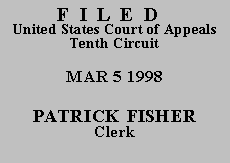

| DAVID J. WALKER,
Petitioner-Appellant, v. KEN KLINGER, Respondent-Appellee. |
|
Petitioner was convicted in an Oklahoma state court of trafficking in illegal drugs and possession of a firearm while committing a felony, based in part on his admission that he was in possession of 9.56 grams of cocaine base. On appeal, he argues that the trial court prevented him from presenting evidence and jury instructions that the cocaine base was for his personal use and, therefore, he was guilty only of simple possession of cocaine base. He further claims that the Oklahoma state statute under which he was convicted, Okla. Stat. tit. 63, § 2-415, is constitutionally infirm because it requires that a defendant be convicted of drug trafficking based solely on the amount of cocaine base he possessed.
The record reflects that the trial court permitted the jury to hear petitioner's evidence that the amount of cocaine base in his possession was suitable for personal use. We have considered petitioner's argument that the trial court improperly refused his tendered jury instructions in the context of the entire trial. We hold that petitioner has failed to demonstrate errors in the jury instructions that rendered his trial fundamentally unfair. See Nguyen v. Reynolds, 131 F.3d 1340, 1357 (10th Cir. 1997).
Petitioner next claims that Okla. Stat. tit. 63, § 2-415 is unconstitutional because it permitted him to be convicted of the crime of drug trafficking based solely on the amount of cocaine base in his possession, even though there was no evidence that he intended to sell the cocaine base. Section 2-415 applies to persons convicted of violations involving possession of cocaine base, see id., § 2-415(A)(7) & (B)(2), in quantities of five grams or more, see id., § 2-415(C)(7). Petitioner concedes that his admission that he possessed 9.56 grams of cocaine base brings him within the purview of § 2-415. He asserts that the statute creates a factual presumption of trafficking based solely on the amount of cocaine base in his possession, in violation of his constitutional right to due process.
Even though this claim was not exhausted in state court, we have jurisdiction and will consider it because, considering Oklahoma law, additional state court proceedings would not be helpful. See Granberry v. Greer, 481 U.S. 129, 131 (1987). On habeas review, we are bound by a state court's application or interpretation of state law unless it violates federal law. See Estelle v. McGuire, 502 U.S. 62, 67-68 (1991); Bowser v. Boggs, 20 F.3d 1060, 1065 (10th Cir. 1994). Oklahoma has considered the argument raised here by petitioner, and concluded that § 2-415 "does not create a presumption a defendant sold the drugs or intended to sell drugs. Rather, the Legislature . . . has defined 'trafficking' as possessing specific amounts of a controlled dangerous substance." Anderson v. State, 905 P.2d 231, 233 (Okla. Crim. App. 1995). Section 2-415 recognizes the legislative intent "that those who possess [a drug in excess of a specified amount] deserve a stiff punishment." Id. (quotation omitted). Petitioner does not allege that federal law prohibits imposing increasingly severe sentences as the amount of cocaine base involved increases. Therefore, we hold that petitioner has failed to establish "that he is in custody in violation of the Constitution or laws or treaties of the United States." 28 U.S.C. § 2254(a).
The judgment of the United States District Court for the Western District of Oklahoma is AFFIRMED. The mandate shall issue forthwith.
Entered for the Court
Circuit Judge
*. The case is unanimously ordered submitted without oral argument pursuant to Fed. R. App. P. 34(a) and 10th Cir. R. 34.1.9. This order and judgment is not binding precedent, except under the doctrines of law of the case, res judicata, and collateral estoppel. The court generally disfavors the citation of orders and judgments; nevertheless, an order and judgment may be cited under the terms and conditions of 10th Cir. R. 36.3.